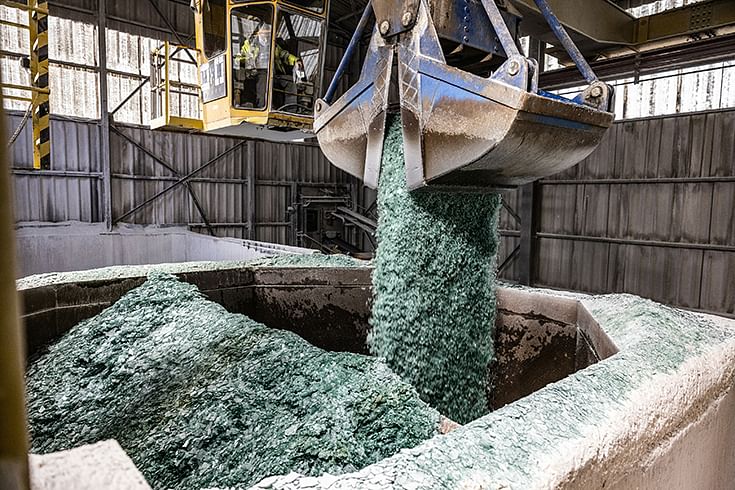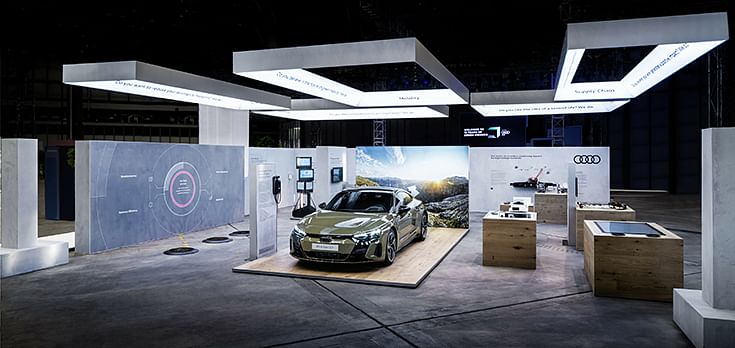Audi’s pilot project for glass recycling becomes standard
From September 2023, recycled glass will be standard in the Audi Q4 e-tron; German Award for Sustainability Projects goes to the carmaker’s ‘GlassLoop’ pilot project.
Audi plans to use glass made of up to 30% recycled material from car windows damaged beyond repair for the windshields in the Q4 e-tron, in the future. In doing so, Audi will successfully shift the ‘GlassLoop’ pilot project into standard production.
Audi, in cooperation with its partner companies, is the first premium auto manufacturer to set up a glass cycle of this kind. Until now, car windows damaged beyond repair – mainly windshields and panoramic roofs – have been used for less demanding purposes, such as bottles or insulation, in what is known as downcycling. The pilot project was the first to demonstrate that glass could be reused at comparable quality. Audi will show just how that works from June 14 to 16 at the 2023 Greentech Festival and sustainability conference in Berlin.
Together with Reiling Glas Recycling, Saint-Gobain Glass, and Saint-Gobain Sekurit, Audi’s GlassLoop project shows how material cycles can be put into serial production. The partner companies spent about a year jointly testing ways to make new windshields for the Audi Q4 e-tron out of defective car glass.
 Audi, Reiling Glas Recycling, Saint-Gobain Glass and Saint-Gobain Sekurit spent about a year jointly testing ways to make new windshields for the Q4 e-tron out of defective car glass.
Audi, Reiling Glas Recycling, Saint-Gobain Glass and Saint-Gobain Sekurit spent about a year jointly testing ways to make new windshields for the Q4 e-tron out of defective car glass.
New panes from old ones
Now the process is ready for standard production: first, the car windows are broken up into small pieces using an innovative recycling process. Then all non-glass elements, like glue residue, are eliminated. The partners melt down the glass granulate obtained in this way and feed it into the production process for automotive plate glass. The secondary content of the glass produced in this way is up to 30 percent. The aim is to provide enough cullet to ensure a share of recycled material over the entire production life of the Audi Q4 e-tron – based on the currently planned production figures. From September 2023, the windshields produced in this way are to be used in the production of the Audi Q4 e-tron.
“If we process car windows that can no longer be repaired so that they are suitable for automotive production again, we need less raw material overall and avoid downcycling car windows that can no longer be repaired,” explains Philipp Eder, Project Manager for Circular Economy in the Supply Chain at Audi. Ultimately, using processed glass granulate makes it possible to reduce the need for primary materials like quartz sand.
 Audi has supported the Greentech sustainability conference as a founding partner since 2020.
Audi has supported the Greentech sustainability conference as a founding partner since 2020.
GlassLoop wins sustainability prize for glass recycling
The GlassLoop project is embedded in Audi’s Act4Impact program for the supply chain. The program’s vision is to configure the effects of Audi’s supply chain to be as gentle as possible on people and the environment.
As one of three awardees, Audi has been honored with the German Award for Sustainability Projects in the ‘Recycling Concept’ category.
Audi states that it wants to establish additional material cycles in the future. The company wants to increase the use of secondary material where it makes ecological and economic sense. “It is our goal to recover as many materials as possible at a high level of quality and reuse them in production,” says Chairman of the Board of Management at AudiAG, Markus Duesmann. This saves valuable primary materials and can reduce the environmental impact of products.
The goal of the circular economy is to preserve material grade and quality for as long as possible. That is critical for making the materials usable within the auto industry again and not relegating them to less demanding uses. One of Audi’s focal areas is post-consumer materials. That means, for example, materials from customer vehicles that have reached the end of their life cycle. The aim is to reduce downcycling, or the decline in the quality of the materials through the recycling process, as much as possible.
RELATED ARTICLES
Autoliv Plans JV for Advanced Safety Electronics With China’s HSAE
The new joint venture, which is to be located strategically near Shanghai and close to several existing Autoliv sites in...
JLR to Restart Production Over a Month After September Hacking
Manufacturing operations at the Tata Group-owned British luxury car and SUV manufacturer were shut down following a cybe...
BYD UK Sales Jump 880% in September to 11,271 units
Sales record sets the UK apart as the largest international market for BYD outside of China for the first time. The Seal...






 By Autocar Professional Bureau
By Autocar Professional Bureau
 08 Jun 2023
08 Jun 2023
 4328 Views
4328 Views










 Ajit Dalvi
Ajit Dalvi




